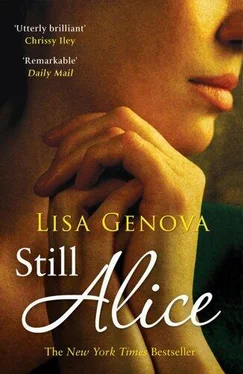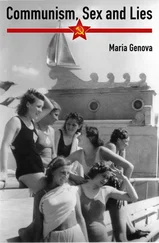Aside from Harold, Alice saw no other loved ones. No other husbands, no wives, no children or grandchildren, no friends.
"We also have a highly trained medical staff should any of our residents require additional care."
By the light of the silvery moon.
"Do you have any residents here under the age of sixty?"
"Oh no, the youngest is I think seventy. The average age is about eighty-two, eighty-three. It's rare to see someone with Alzheimer's younger than sixty."
You're looking at one right now, lady.
By the light of the silvery moon.
"How much does all of this cost?"
"I can give you a packet of information on the way out, but as of January, the Alzheimer's Special Care Unit rate runs at two hundred eighty-five dollars a day."
Alice did the rough math in her head. About a hundred thousand dollars a year. Multiply that by five, ten, twenty years.
"Can I answer anything else for you?"
By the light.
"No, thanks."
She followed her tour guide back to the locked double doors and watched her type in the code.
0791925
She didn't belong here.
IT WAS THE RAREST OF days in Cambridge, the kind of mythical day that New Englanders dreamed about but each year came to doubt the true existence of--a sunny, seventy-degree spring day. A Crayola blue sky, finally-don't-need-a-coat spring day. A day not to be wasted sitting in an office, especially if you had Alzheimer's.
She deviated a couple of blocks southeast of the Yard and walked into Ben & Jerry's with the giddy thrill of a teenager playing hooky.
"I'll have a triple-scoop Peanut Butter Cup in a cone, please."
Hell, I'm on Lipitor.
She beheld her giant, heavy cone as if it were an Oscar, paid with a five-dollar bill, dropped the change in the Tips for College jar, and continued on toward the Charles River.
She'd converted to frozen yogurt, a supposedly healthier alternative, many years ago and had forgotten how thick and creamy and purely enjoyable ice cream was. She thought about what she had just seen at the Mount Auburn Manor Nursing Center as she licked and walked. She needed a better plan, one that didn't include her playing beanbag toss with Evelyn in the Alzheimer's Special Care Unit. One that didn't cost John a fortune to keep alive and safe a woman who no longer recognized him and who, in the most important ways, he didn't recognize either. She didn't want to be here at that point, when the burdens, both emotional and financial, grossly outweighed any benefit of sticking around.
She was making mistakes and struggling to compensate for them, but she felt sure that her IQ still fell at least a standard deviation above the mean. And people with average IQs didn't kill themselves. Well, some did, but not for reasons having to do with IQ.
Despite the escalating erosion of her memory, her brain still served her well in countless ways. For example, at this very moment, she ate her ice cream without dripping any of it onto the cone or her hand by using a lick-and-turn technique that had become automatic to her as a child and was probably stored somewhere near the information for how to ride a bike and how to tie a shoe. Meanwhile, she stepped off the curb and crossed the street, her motor cortex and cerebellum solving the complex mathematical equations necessary to move her body to the other side without falling over or getting hit by a passing car. She recognized the sweet smell of narcissus and a brief waft of curry emanating from the Indian restaurant on the corner. With each lick, she savored the delicious tastes of chocolate and peanut butter, demonstrating the intact activation of her brain's pleasure pathways, the same ones required for enjoying sex or a good bottle of wine.
But at some point, she would forget how to eat an ice-cream cone, how to tie her shoe, and how to walk. At some point, her pleasure neurons would become corrupted by an onslaught of aggregating amyloid, and she'd no longer be capable of enjoying the things she loved. At some point, there would simply be no point.
She wished she had cancer instead. She'd trade Alzheimer's for cancer in a heartbeat. She felt ashamed for wishing this, and it was certainly a pointless bargaining, but she permitted the fantasy anyway. With cancer, she'd have something that she could fight. There was surgery, radiation, and chemotherapy. There was the chance that she could win. Her family and the community at Harvard would rally behind her battle and consider it noble. And even if defeated in the end, she'd be able to look them knowingly in the eye and say good-bye before she left.
Alzheimer's disease was an entirely different kind of beast. There were no weapons that could slay it. Taking Aricept and Namenda felt like aiming a couple of leaky squirt guns in the face of a blazing fire. John continued to probe into the drugs in clinical development, but she doubted that any of them were ready and capable of making a significant difference for her, else he would already have been on the phone with Dr. Davis, insisting on a way to get her on them. Right now, everyone with Alzheimer's faced the same outcome, whether they were eighty-two or fifty, resident of the Mount Auburn Manor or full professor of psychology at Harvard University. The blazing fire consumed all. No one got out alive.
And while a bald head and a looped ribbon were seen as badges of courage and hope, her reluctant vocabulary and vanishing memories advertised mental instability and impending insanity. Those with cancer could expect to be supported by their community. Alice expected to be outcast. Even the well-intentioned and educated tended to keep a fearful distance from the mentally ill. She didn't want to become someone people avoided and feared.
Accepting the fact that she did indeed have Alzheimer's, that she could only bank on two unacceptably effective drugs available to treat it, and that she couldn't trade any of this in for some other, curable disease, what did she want? Assuming the in vitro procedure worked, she wanted to live to hold Anna's baby and know it was her grandchild. She wanted to see Lydia act in something she was proud of. She wanted to see Tom fall in love. She wanted one more sabbatical year with John. She wanted to read every book she could before she could no longer read.
She laughed a little, surprised at what she'd just revealed to herself. Nowhere in that list was there anything about linguistics, teaching, or Harvard. She ate her last bite of cone. She wanted more sunny, seventy-degree days and ice-cream cones.
And when the burden of her disease exceeded the pleasure of that ice cream, she wanted to die. But would she quite literally have the presence of mind to recognize it when those curves crossed? She worried that the future her would be incapable of remembering and executing this kind of plan. Asking John or any of her children to assist her with this in any way was not an option. She'd never put any of them in that position.
She needed a plan that committed the future her to a suicide she arranged for now. She needed to create a simple test, one that she could self-administer every day. She thought about the questions Dr. Davis and the neuropsychologist had asked her, the ones she already couldn't answer last December. She thought about what she still wanted. Intellectual brilliance wasn't required for any of them. She was willing to go on living with some serious holes in short-term memory.
She removed her BlackBerry from her baby blue Anna William bag, a birthday gift from Lydia. She wore it every day, slung over her left shoulder, resting on her right hip. It had become an indispensable accessory, like her platinum wedding ring and running watch. It looked great with her butterfly necklace. It contained her cell phone, her BlackBerry, and her keys. She took it off only to sleep.
Читать дальше












